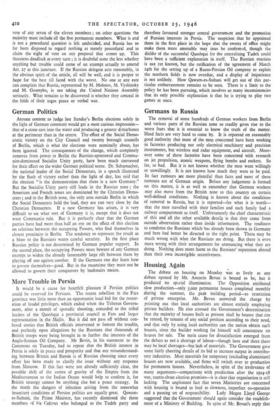Housing Again
The debate on housing on Monday was as lively as any debate opened by Mr. Aneurin Bevan is bound to be, but it produced no spzcial illumination. The Opposition attributed slow production—only 5,000 permanent houses completed monthly during the summer, the peak building period—to restriction of private enterprise. Mr. Bevan answered the charge by pointing out that local authorities are almost entirely employing private builders. He also stressed the Government's determination that the majority of houses built at present shall be houses that Can be rented, by tenants of any social position according to their need, and that only by using local authorities can the nation obtain such house's, since the builder working for himself will concentrate on houses for sale. The main cause for dissatisfaction emerged from the debate as not a shortage of labour—though here and there there may be local shortages—but lack of materials. The Government gave some fairly cheering details of its bid to increase output in contribu- tory industries. Most materials for temporary (excluding aluminium) houses are now available, and firms will switch over to production for permanent houses. Nevertheless, in spite of the irrelevance of many arguments—comparisons with production after the 1914-18 war, taunts about election promises—it is clear that organisation is still lacking. The unpleasant fact that seven Ministries are concerned with housing is bound to lead to slowness, imperfect co-operation and a passing -on of responsibility. Lady Megan Lloyd George suggested that the Government should again-consider the establish- ment of a Ministry of Building. In spite of Mr. Bevan's reply that the delay was due to the building industry, not Whitehall, and that she was "looking too far ahead," her suggestion may yet prove wise.































 Previous page
Previous page